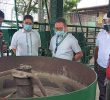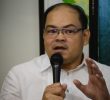DAVAO CITY— If elected mayor of Davao City, first district Congressman Prospero Nograles said he will make the business climate of Davao attractive to investors.
In a mayoralty forum at the Ateneo de Davao University in March, Nograles said he sees the need to build roads and bridges and other facilities in the city to attract foreign and domestic investors. “Such projects are not impossible, given the 3.7-billion peso budget of the city,” Nograles said. “Put some roads, here and there and people will come.”
“I believe it is the government’s duty to provide these facilities so that the private sector will come,” Nograles said, “Once investors start coming, jobs will also be available.”
Nograles cited the city’s Maa village which looks upbeat because of the presence of good roads and other infrastructures.
Nograles view of development relies on the presence of foreign investors to generate jobs for the people.

Speaker Prospero Nograles bares his platforms in a mayoralty forum at the Ateneo de Davao University. (davaotoday.com photo by Jose Hernani)
But in the article “The Economic Folly of Charter Change,” research think-tank Ibon said the entry of foreign investments does not necessarily translate into development. The article was a critique to the proposal to change the Philippine Constitution to allow complete foreign ownership of the country’s resources.
“It seems that the mere presence of foreign capital is taken to mean that development is happening,” Ibon said.
Ibon said that theoretically, foreign direct investments (FDI) immediately create jobs, open up the inflow of foreign capital, increase export earnings, fuel the production of goods and services, and usher in technology transfer. But it could also result to job losses because several local firms will have to close down.
In fact, the entry of foreign firms might also stunt the growth of the local industry, Ibon said. Once foreign investors come in, importation of capital, intermediate and consumer goods will also increase. The country will suffer from loss of natural resources and from the monopoly pricing of utilities and services.
According to Ibon, foreign investment is potentially useful as long as the government sets the terms to ensure that it will not conflict with the national development that the country wants to achieve.
To ensure this, FDIs should be monitored, guided and controlled, something that transnational companies (TNCs) do not want. TNCs want to have lesser government intervention “to give them freest play in the economy to extract and repatriate their profits,” the Ibon article said.
The government had been granting extraordinary privileges and fiscal incentives to FDIs over the last two decades, Ibon pointed out.
“That’s why foreign investors have been able to make their profits without any real contribution to domestic social and economic development,” said Ibon.
Ibon also pointed out that jobs created by FDI’s in the domestic economy are not sustainable. The number of jobless Filipinos has continued to rise, referring to the 2001-2008 period as the worst eight-year period of recorded unemployment in the country’s history.










